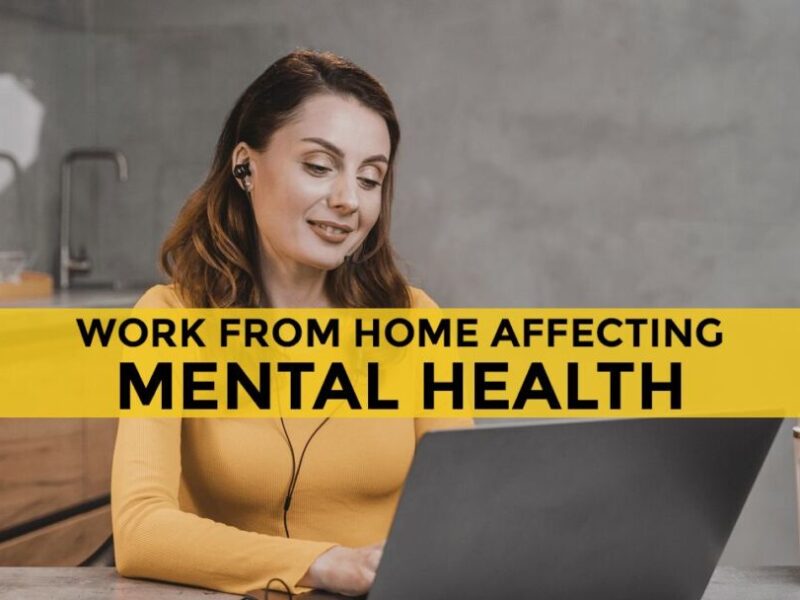
If you’re looking for a job, it’s important to keep in mind the way your mental health will affect your life. If you work from home, there are some potential benefits and drawbacks to consider. While working from home can be beneficial for some people and even lead to greater productivity, there are also risks involved, especially if you’re suffering from depression or anxiety.
Can you have a happy, healthy life if you work from home?
Yes. You can have a happy, healthy life if you work from home. If you are motivated and disciplined, working from home can be a good option for many people.
But it’s not easy to stay on track with your goals when you’re not around other people or outside in nature. You need to take breaks from time-consuming tasks like cleaning and cooking meals. So that they don’t consume every moment of your day.
Depression and Anxiety symptoms can be harder to spot when working from home.
When you work from home, it’s easy to forget that your co-worker is a real person. You can’t see the body language of someone who is tired or anxious, for example. You also can’t see if they are eating properly or sleeping regularly. Working from home makes it more difficult for people to notice depression or anxiety symptoms in their coworkers in these and other ways than if they worked in an office environment where other people were around them all day long making eye contact (or even just having conversations).
Working from home can create feelings of loneliness or isolation.
Because you are not surrounded by other people, your social life may suffer. You may feel as though you’re missing out on the benefits that come with working in an office environment. Such as having lunch or coffee breaks with coworkers and interacting with them outside of work hours.
If this describes your situation and you’d like to get help coping with loneliness and isolation. Consider joining a local community group or volunteering at your children’s school. Where there will probably be other parents who share similar interests, such as sports or music lessons. Or consider getting involved in activities offered by organizations that provide opportunities for volunteers to meet new people while helping others in their communities
Working from home has been linked to higher rates of anxiety, stress, and burnout.
When you’re working from home, it can be hard for your coworkers to get ahold of you. This can lead to feelings of loneliness that many people don’t experience when they work in an office setting. Working from home also makes it harder for employees who are busy with their family life or other commitments. Like taking care of pets or children—to get everything done on time. Because there aren’t always other people around who can help pick up the slack when needed.
Furthermore, working from home encourages procrastination as well as more introspection than working in an office environment. And if someone suffers from an anxiety disorder or depression symptoms? Well, then things could get pretty bad. According to recent research published by The Journal Of Medical Economics, “working at home is associated with higher rates of job strain” among workers who have these conditions.”
Lack of social interaction is one of the biggest challenges facing workers who try to stay at home.
Social interaction is one of the biggest challenges facing workers who try to stay at home. We all know that socializing is important for mental health. And it can help us feel less isolated, which in turn can lead to depression and anxiety.
The good news: There are ways to overcome this lack of social interaction when working from home.
Workers who stay at home may feel stuck in a rut and struggle with motivation.

Work-from-home workers may find that they’re more likely to procrastinate. This can be especially true if you aren’t able to leave the house very often while working in an office setting. Because now your schedule is completely dictated by your household responsibilities.
Working from home also makes it more difficult for workers who struggle with social interaction on a regular basis. Loneliness and isolation are common obstacles for those who work from home. After all, there’s no one else around them except their pets (if they have any). For example, if someone has trouble making conversation with others at work or school, this could lead them to feel isolated at home as well—and vice versa!
Working from home can lead to more procrastination than working in an office setting.
One of the biggest challenges for people who work from home is that they often feel like they’re not getting everything done. They may start to feel guilty about this, and it can lead to procrastination.
In an office setting, you have someone else to answer to—the boss or your coworkers—who will give you reminders when it’s time to go into the office or finish up on a project at home. This helps keep things moving forward in a productive way.
If you’re self-employed and don’t have anyone overseeing your work (or if they’ve left), it’s important that you find ways of motivating yourself. So that working from home doesn’t become another chore instead of something exciting! Setting deadlines and creating a routine are two great ways of keeping yourself accountable for completing tasks before their due dates. And if these aren’t enough motivation for today then maybe tomorrow won’t be either…
There are many options for working from home, but there are also many that are not ideal for our mental health
Working from home can be good for our mental health. It gives us the freedom to be in control of our schedule and location, which is often more important than the actual work itself. However, there are also many challenges associated with working from home that may not be ideal for your mental health:
We often put ourselves under pressure by setting unrealistic expectations. For example, if you’re a stay-at-home parent who works from home full time but gets only 3 hours of sleep per night because you have an infant or toddler at home, this may add up over time—and then one day when you’re in need of some extra rest (or even just some extra energy), it’s hard not to feel frustrated or anxious about all those hours spent tending to babies instead of getting work done. Working remotely means missing out on social interaction outside your circle; while this might initially seem like an advantage (no commute!), living too far away makes it difficult for friends/family members who come visit out-of-state during holidays
How you can take care of your Mental Health while working from home?
Working from home has a high mental health cost, but you can mitigate this by taking care of yourself while you work. To make sure you’re taking care of yourself while working from home, it’s important to keep a few things in mind.

- First, break up the day into short chunks. Make sure that each chunk is just long enough for you to get something done and then take a break. This will help prevent mental fatigue or overwork, which can lead to depression and anxiety.
- It’s also important not just to work through lunch but also to get outside every once in a while; even if it’s only for an hour at the park with your kids or dog!
- Next up: exercise regularly; this way when those big projects come along (or even when they don’t), there’ll already be some physical activity under your belt before starting on them!
- Finally—and perhaps most importantly—stay mindful about how much sleep you’re getting each night; if possible try sleeping later than usual so that there won’t be as many hours between waking up and going back into work mode again the next morning!
Conclusion
There are many options for working from home, but there are also many that are not ideal for our mental health. If you find yourself experiencing any of these symptoms, it may be time to consider changing your work situation. And if you’re still struggling with anxiety or depression, think about seeing a professional who can discuss ways to help manage those feelings while you’re at home.





